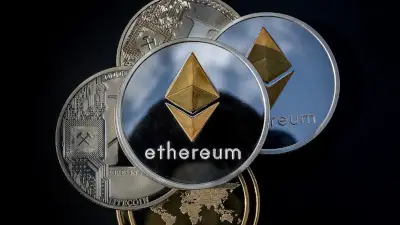What is Ethereum?

Ethereum is an open-source, blockchain-based platform that enables developers to build and deploy decentralized applications (dApps). Created by Vitalik Buterin and launched in 2015, Ethereum extends the concept of blockchain beyond cryptocurrency, introducing a decentralized platform capable of executing smart contracts.
The Genesis of Ethereum
Ethereum was proposed by Vitalik Buterin in late 2013, with development starting in early 2014. The platform went live on July 30, 2015, with 72 million pre-mined coins. Ethereum was conceived to address the limitations of Bitcoin's scripting language, offering a more robust and flexible platform for blockchain applications.
Key Components of Ethereum
Ethereum Virtual Machine (EVM)
The Ethereum Virtual Machine (EVM) is the runtime environment for smart contracts in Ethereum. It is a Turing-complete virtual machine that allows code to be executed exactly as intended. The EVM is isolated from the network and the filesystem, ensuring secure execution of code.
Smart Contracts
Smart contracts are self-executing contracts with the terms directly written into code. They automatically enforce and execute the terms of an agreement when predefined conditions are met, reducing the need for intermediaries. Smart contracts on Ethereum are written in Solidity, a purpose-built programming language.
Decentralized Applications (dApps)
Decentralized applications, or dApps, are applications that run on a decentralized network, such as Ethereum. These applications are built using smart contracts and leverage the security and transparency of the blockchain. dApps cover a wide range of use cases, from finance and gaming to supply chain management and social media.
How Ethereum Works
Blockchain and Consensus
Ethereum operates on a blockchain, a decentralized ledger that records all transactions across a network of computers. Consensus is achieved through a protocol called Proof of Stake (PoS), specifically Ethereum's variant known as Casper. PoS validators are selected to create new blocks and validate transactions based on the amount of cryptocurrency they hold and are willing to "stake" as collateral.
Gas and Transactions
Transactions on the Ethereum network require computational work, measured in units called "gas." Gas is the fee required to conduct a transaction or execute a smart contract on Ethereum. Users pay for gas in Ether (ETH), the native cryptocurrency of the Ethereum network. Gas fees incentivize miners to process and validate transactions.
Ethereum's Evolution and Upgrades
Ethereum 2.0
Ethereum 2.0, also known as Eth2 or Serenity, is a series of upgrades aimed at improving the scalability, security, and sustainability of the Ethereum network. The key features of Ethereum 2.0 include the transition from Proof of Work (PoW) to Proof of Stake (PoS) and the introduction of shard chains.
Beacon Chain
The Beacon Chain is the backbone of Ethereum 2.0, responsible for managing the Proof of Stake protocol and coordinating the network of shard chains. Launched in December 2020, the Beacon Chain runs in parallel with the Ethereum mainnet until the full transition to Ethereum 2.0 is complete.
Shard Chains
Shard chains are a scalability solution that splits the Ethereum network into smaller pieces, or "shards," each capable of processing its own transactions and smart contracts. Shard chains enable parallel processing, significantly increasing the network's capacity and performance.
Applications and Use Cases
Decentralized Finance (DeFi)
Decentralized Finance, or DeFi, is one of the most prominent use cases for Ethereum. DeFi encompasses a wide range of financial services, including lending, borrowing, trading, and earning interest, all without traditional intermediaries. Popular DeFi platforms include Uniswap, Aave, and Compound.
Non-Fungible Tokens (NFTs)
Non-Fungible Tokens (NFTs) are unique digital assets representing ownership of a specific item or piece of content, such as art, music, or collectibles. NFTs are typically built on Ethereum using the ERC-721 or ERC-1155 token standards. The NFT market has seen explosive growth, with platforms like OpenSea and Rarible leading the way.
Enterprise Blockchain Solutions
Ethereum is also utilized in enterprise blockchain solutions. Businesses use Ethereum to create private or consortium blockchains, leveraging its smart contract capabilities for supply chain management, identity verification, and more. The Enterprise Ethereum Alliance (EEA) fosters collaboration and innovation among organizations building on Ethereum.
Challenges and Considerations
Scalability
Scalability remains one of Ethereum's biggest challenges. The current network can handle a limited number of transactions per second, leading to congestion and high gas fees during peak times. Ethereum 2.0 aims to address these issues, but the transition is a complex and gradual process.
Security
While Ethereum's blockchain is secure, smart contract vulnerabilities can pose significant risks. Poorly written or audited smart contracts have been exploited, leading to substantial financial losses. Best practices in smart contract development and thorough audits are essential to mitigate these risks.
Regulation
The regulatory landscape for Ethereum and other cryptocurrencies is continually evolving. Governments worldwide are working to establish frameworks that address issues like consumer protection, anti-money laundering (AML), and taxation. Regulatory clarity is crucial for the continued growth and adoption of Ethereum.
The Future of Ethereum
The future of Ethereum is promising, with ongoing developments and a vibrant ecosystem of developers, businesses, and users driving innovation. Ethereum 2.0 will play a pivotal role in enhancing the network's scalability, security, and sustainability. As Ethereum continues to evolve, it is poised to maintain its position as a leading platform for decentralized applications and smart contracts.
Conclusion
Ethereum represents a groundbreaking advancement in blockchain technology, offering a versatile platform for decentralized applications and smart contracts. Its ability to enable trustless, transparent, and automated processes has far-reaching implications across various industries. While challenges remain, the ongoing evolution of Ethereum ensures it will remain at the forefront of the blockchain revolution.
External Sources
- Ethereum Whitepaper. Ethereum.org.